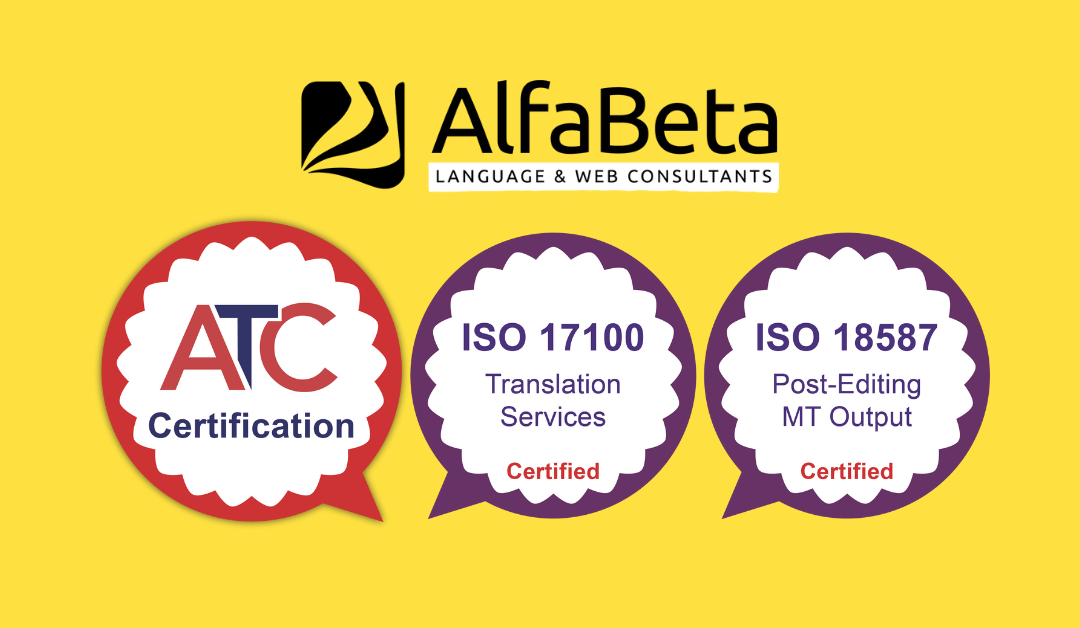1 July 2022: a date that will definitely go down in AlfaBeta history, because after 33 years in the language business, our company has at last obtained certification for two of the main services offered to its broad and diverse clientele: translation and post-editing of machine translation. The two certifications are issued by the ATC (Association of Translation Companies), which represents translation agencies in the United Kingdom.
Argomenti
ISO 17100 certification for translation services
Who hasn’t heard of the famous ISO 9001 standard?
But not so many have come across ISO 17100, pertaining to Translation Services. It’s primarily the preserve of those operating in the sector, such as translation agencies and Language Service Providers (LSPs), while the majority of clients are unaware of the process involved in ensuring professional standards of service in the field of translation.
What does ISO 17100 say?
The standard “specifies requirements for all aspects of the translation process directly affecting the quality and delivery of translation services. It includes provisions for translation service providers (TSPs) concerning the management of core processes, minimum qualification requirements, the availability and management of resources and other actions necessary for the delivery of a quality translation service. The use of raw output from machine translation, followed by post-editing (i.e. revision by a human translator) is not covered by this standard, and likewise for interpretation services.”
Consequences for clients and collaborators
Very little will actually change in our processes: we will continue to offer the translation of documents by qualified professionals, reviewed by a second translator and, where necessary, by an expert in the field. For content destined for publication, this may also be followed by proofreading, i.e. correction of copy.
Furthermore, all our language consultants must demonstrate their skills and qualifications by sending us the relevant certification of their education and professional experience.
“Although this means more admin work”, says Agnese Duranti, Project Manager at AlfaBeta, “jobs are documented and archived in a more efficient manner, and this ensures that our processes are clearer and more transparent. To put it bluntly, the client knows what they’re paying for.”
With regard to staff, particularly freelancers (currently some 70 linguists), ISO certification gives greater control over the recruitment, training and management of human resources. This means clients can be confident that competent professionals are used, who work in exactly the same way as internal staff, guaranteeing consistent results.
ISO 18587 certification for MTPE
MTPE (Machine Translation Post Editing) is the editing process carried out by a human on the raw output of a machine translation engine, i.e. software that produces text which requires revision and correction by a second linguist.
Always true to its commitment to remain at the technological forefront, AlfaBeta decided to gain the (relatively recent) ISO 18587 certification in addition to the ISO 17100, allowing the company to offer a range of rates and quality levels to cater for the specific needs of clients.
ISO 18587 certification actually involves a process of evaluating the output of a specific translation engine for a given text. This allows us to make an accurate assessment of the feasibility of an MTPE project and its relative benefits, such as shorter processing times and reduced costs.
The ISO 18587 standard also concerns the skills of post-editors and any specific training. Thanks to its own online training centre, the European School of Translation, Alfabeta is able to provide specially designed courses to develop the skills of translators in this promising new field.
Acknowledgements and future prospects
We want to thank the people who have helped us achieve this prestigious outcome, in particular our very own Martina Stea, whose professionalism, positive outlook and enthusiasm were invaluable in compiling all the necessary documentation and optimising our procedures.
Thanks also to Chris Cox, our auditor at ATC and a true professional whose calm and experience guided us towards our goal gently but surely.
Additional thanks to our teacher Sara Grizzo, who opened the doors to the world of professional development. Her course, Post-editing: istruzioni per l’uso, continues to be a reference for anyone approaching the world of post-editing.
In conclusion, a word about the future. Obtaining quality certification is not the final goal, but a starting point which we hope will lead AlfaBeta to further improve its services and adapt them to advances in technology, society and economics.
The objective remains that which has guided AlfaBeta from the outset: to provide a service of the quality required by the client, offering the most appropriate response to their needs in a spirit of collaboration and partnership.
Agnese, Andrea, and Raffaella

